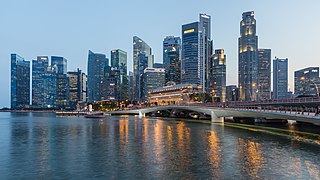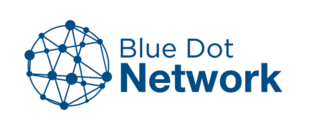Components of individual economic security
In the United States, children's economic security is indicated by the income level and employment security of their families or organizations. [3] Economic security of people over 50 years old is based on Social Security benefits, pensions and savings, earnings and employment, and health insurance coverage. [4]
Arizona
In 1972, the state legislature of Arizona formed a Department of Economic Security with a mission to promote "the safety, well-being, and self sufficiency of children, adults, and families". This department combines state government activities previously managed by the Employment Security Commission, the State Department of Public Welfare, the Division of Vocational Rehabilitation, the State Office of Economic Opportunity, the Apprenticeship Council, and the State Office of Manpower Planning. The State Department of Mental Retardation (renamed the Division of Developmental Disabilities, House Bill 2213) joined the Department in 1974 . The purpose in creating the Department was to provide an integration of direct services to people in such a way as to reduce duplication of administrative efforts, services and expenditures. Family Connections became a part of the Department in January 2007. [5]
Minnesota
The Minnesota Department of Economic Security was formed in 1977 from the departments of Employment Services and Vocational Rehabilitation, the Governor's Manpower Office, and the Economic Opportunity Office, which administered anti-poverty programs. In 1985, State Services for the Blind was included in this department. In 2003, the Minnesota Department of Economic Security and Minnesota Department of Trade and Economic Development were merged to form The Minnesota Department of Employment and Economic Development. [6]
National economic security
In the context of domestic politics and international relations, national economic security is the ability of a country to follow its choice of policies to develop the national economy in the manner desired. Historically, conquest of nations have made conquerors rich through plunder, access to new resources and enlarged trade through controlling of the economies of conquered nations. Today's complex system of international trade is characterized by multi-national agreements and mutual inter-dependence. Availability of natural resources and capacity for production and distribution are essential under this system, leading many experts to consider economic security to be as important a part of national security as military policy.
Economic security has been proposed as a key determinant of international relations, particularly in the geopolitics of petroleum in American foreign policy after 1973 oil crisis and September 11, 2001. [7]
In Canada, threats to the country's overall economic security are considered economic espionage, which is "illegal, clandestine or coercive activity by a foreign government in order to gain unauthorized access to economic intelligence, such as proprietary information or technology, for economic advantage." [8]
In January 2021, the United States Department of Homeland Security (DHS) issued Strategic Action Plan to Counter the Threat Posed by China. [9]
In October 2021 in Japan, prime minister Fumio Kishida created the first-ever ministerial post for economic security. [10] And in April 2022, Japan's National Diet passed an economic security bill aimed at guarding technology and reinforcing critical supply chains, while also imposing tighter oversight of Japanese firms working in sensitive sectors or critical infrastructure. Measures in the legislation, which is primarily aimed at warding off risks from China, will be implemented over two years once it is enacted, according to the bill. [11]
In March 2023, Japan and Germany agreed to strengthen cooperation on economic security in the aftermath of tensions over global supply chains and the economic impact of the war in Ukraine. In the first high-ministerial government consultations held between the two countries, German Chancellor Olaf Scholz reached out to Tokyo to seek to reduce Germany's dependence on China for imports of raw materials. [12]
On April 4, 2023, a G7 Trade Ministers' Meeting via video conference was held to discuss on enhancing economic security, and a G7 Trade Ministers' Statement was issued on the day. [13] Also in April 2023, Japan's Public Security Intelligence Agency (PSIA) launched a division dedicated to economic security. The agency also plans to set up such dedicated units in its regional bureaus nationwide to step up efforts to prevent cutting-edge technology and data from being leaked out of the country. [14] On 20 May 2023 on occasion of the G7 Hiroshima summit, economic security was discussed for the first time as the G7 agenda, [15] and "G7 Leaders' Statement on Economic Resilience and Economic Security" was issued based on the discussion. [16]
On 20 June 2023, the European Commission and the High Representative proposed a Joint Communication on a European Economic Security Strategy which will be discussed by EU leaders at their meeting. [17]

The economy of Japan is a highly developed/advanced social market economy, often referred to as an East Asian model. It is the 4th-largest economy in the world by nominal GDP behind the United States, China, and Germany and the 4th-largest by purchasing power parity (PPP).

The economy of Singapore is a highly developed mixed market economy with dirigiste characteristics. Singapore's economy has been consistently ranked as the most open in the world, the joint 4th-least corrupt, and the most pro-business. Singapore has low tax-rates and the highest per-capita GDP in the world in terms of purchasing power parity (PPP). The Asia-Pacific Economic Cooperation (APEC) is headquartered in Singapore.

The Group of Eight (G8) was an inter-governmental political forum from 1997 until 2014. It had formed from incorporating Russia into the Group of Seven, or G7, and returned to its previous name after Russia was expelled in 2014.

The Group of Seven (G7) is an intergovernmental political and economic forum consisting of Canada, France, Germany, Italy, Japan, the United Kingdom and the United States; additionally, the European Union (EU) is a "non-enumerated member". It is organized around shared values of pluralism, liberal democracy, and representative government. G7 members are the major IMF advanced economies.

The G20 or Group of 20 is an intergovernmental forum comprising 19 sovereign countries, the European Union (EU), and the African Union (AU). It works to address major issues related to the global economy, such as international financial stability, climate change mitigation and sustainable development.
Supply chain security activities aim to enhance the security of the supply chain or value chain, the transport and logistics systems for the world's cargo and to "facilitate legitimate trade". Their objective is to combine traditional practices of supply-chain management with the security requirements driven by threats such as terrorism, piracy, and theft. A healthy and robust supply chain absent from security threats requires safeguarding against disturbances at all levels such as facilities, information flow, transportation of goods, and so on. A secure supply chain is critical for organizational performance.
The Financial Stability Forum (FSF) was a group consisting of major national financial authorities such as finance ministries, central bankers, and international financial bodies. It was first convened in April 1999 in Washington. At the 2009 G20 London summit, the G20 nations established a successor to the FSF, called the Financial Stability Board with an expanded membership and broadened mandate.
The Financial Stability Board (FSB) is an international body that monitors and makes recommendations about the global financial system. It was established in the 2009 G20 Pittsburgh Summit as a successor to the Financial Stability Forum (FSF). The Board includes all G20 major economies, FSF members, and the European Commission. Hosted and funded by the Bank for International Settlements, the board is based in Basel, Switzerland, and is established as a not-for-profit association under Swiss law.
The U.S.–China Strategic and Economic Dialogue (S&ED) was a high-level dialogue for the United States and China to discuss a wide range of regional and global strategic and economic issues between both countries. The establishment of the S&ED was announced on April 1, 2009, by U.S. President Barack Obama and Chinese President Hu Jintao. The upgraded mechanism replaced the former Senior Dialogue and Strategic Economic Dialogue started under the George W. Bush administration. High-level representatives of both countries and their delegations will met annually at capitals alternating between the two countries.

The 41st G7 summit was held in Schloss Elmau, Krün, Bavaria, Germany on 7–8 June 2015. In March 2014 the remaining members of the G8 declared that a meaningful discussion was currently not possible with Russia, and since then meetings have continued under the G7 name.
International sanctions have been imposed against Russia and Crimea during the Russo-Ukrainian War by a large number of countries, including the United States, Canada, the European Union, and international organisations following the Russian annexation of Crimea, which began in late February 2014. Belarus has also been sanctioned for its cooperation with and assistance to Russian armed forces. The sanctions were imposed against individuals, businesses, and officials from Russia and Ukraine. Russia responded with sanctions against several countries, including a total ban on food imports from Australia, Canada, Norway, Japan, the United States, the EU and the United Kingdom.

The Department for Business, Energy, and Industrial Strategy (BEIS) was a department of His Majesty's Government.

The 47th G7 summit was held from 11 to 13 June 2021 in Cornwall, England, during the United Kingdom's tenure of the presidency of the Group of Seven (G7), an inter-governmental political forum of seven advanced nations.
The Integrated Review of Security, Defence, Development and Foreign Policy, often known as the Integrated Review, and titled as Global Britain in a Competitive Age, was a review carried out by the British government led by Boris Johnson into the foreign, defence, security and international development policies of the United Kingdom. Described by Johnson as "the largest review of its kind since the Cold War", the review was published on 16 March 2021.

The Blue Dot Network (BDN) is a certification framework for quality infrastructure projects. The initiative is a joint project of the governments of Australia, Czech Republic, Japan, Spain, Switzerland, United Kingdom, and the United States that supports investment in high-quality infrastructure projects around the world, especially by the private sector.

The 48th G7 summit was held from 26 to 28 June 2022 in Schloss Elmau, Krün, Bavarian Alps, Germany. Germany previously hosted a G7 summit in 2015 at Schloss Elmau.
G7 and G8 ministerial meetings are meetings of the government ministers of the G7 and G8 countries. G7 summit meetings originated in an ad hoc gathering of finance ministers in 1973.

The Partnership for Global Infrastructure and Investment (PGII) is a collaborative effort by Group of Seven to fund infrastructure projects in developing nations based on the trust principles of the Blue Dot Network. It is considered to be the bloc's counter to China's Belt and Road Initiative and a key component of the "Biden Doctrine".

The 49th G7 summit was held from 19 to 21 May 2023 in the city of Hiroshima in Hiroshima Prefecture.











